Pope Benedict XVI comes from villages near Munich, and like all expatriates he will want to be homeward bound some time. Yesterday he was back in Munich with much fanfare just like my popular friends when they return home from abroad. He toured the streets of the inner city before conducting an outdoor mass at Marienplatz. Naturally I was rather curious and went to witness his home-coming since it’s not the easiest thing to see the Pope face-to-face.
Not everyone was glad to see him around town, however. The streets and shops were noticeably quieter than usual, and the shops along the touring route had to close because of security reasons or because there was no way customers could beat the crowd to reach the shops. The Pope’s visit was hardly a godsend for the business owners.
My colleagues warned me beforehand that the crowd would be horrible. Well, it wasn’t too bad before he arrived. I could find myself a good spot to see and photograph the Pope in a street near Marienplatz. But when everyone started heading to Marienplatz for the mass, it was impossible to move on one’s own accord but only through pushes from the back. I finally settled into a place to watch the mass, but unfortunately I could only rely on the broadcast on big screen. The Pope was on the opposite side of Marienplatz to where he entered, and I was separated from him by the massive crowd and the statue of Mary in the centre of the square. I still have to figure out what makes the Pope such a popular guy that can stop the world and pull in big crowds to his ‘party’.
教宗本篤十六世來自慕尼黑附近的小鎮,跟很多到外地打工的人一樣會回鄉探親,他昨天光臨慕尼黑,就像我廣結人緣的朋友一樣,一回國就自動有人會安排慶祝活動——就是巡遊市區及在市中心瑪利亞廣場舉行露天彌撒。難得有機會親眼見教宗,我也去湊湊熱鬧。
也不是所有人都歡迎他歸來,昨午街道和店鋪平常的人潮消失了,巡遊路線沿途的商店更因保安或街道太擠的問題而被迫休息,教宗來訪可算「多謝兼盛惠」了。(按:「多謝兼盛惠」乃廣東話反語。)
同事曾預告街道將會很擠,其實教宗未到前也不壞,一個鐘頭前也能在瑪利亞廣場附近的一條路找到有利位置觀看和拍攝,但當所有人從巡遊沿途一同湧往露天彌撒時,根本走也走不動,全靠人推人前進,好容易才找到一個位置觀看彌撒,可是他位處進入廣場的另一邊,中間隔着人群及廣場中央的瑪利亞人像,我祇好靠看大銀幕的轉播。教宗究竟有何魅力,令凡人無法擋?
Before the Pope arrived 教宗抵達前

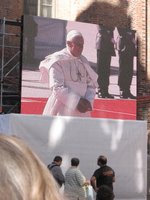
The Pope touching down in Munich, as seen from a TV screen
銀幕播映教宗下機
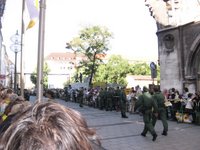
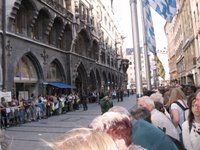
The crowd waiting in anticipation 萬眾期待
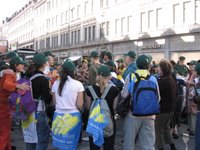 A more jubilous way to wait, by chanting and dancing
A more jubilous way to wait, by chanting and dancing
唱歌跳舞,興高采烈等待教宗來臨
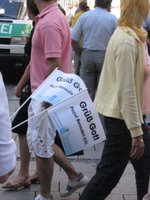
Greet God (Grüß Gott), and greet the Pope! ('Grüß Gott' is a popular greeting phrase in Southern Germany in Austria.)
教宗你好!
I saw the Pope! 我見到教宗!
I filmed the Pope as he was travelling along the last section of the touring route! See this link below.
我拍下了教宗巡遊最後一段路程的片段,點擊以下即可見。
http://www.youtube.com/v/XcIduLhv1Eg
The outdoor mass 露天彌撒
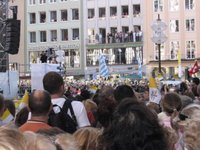
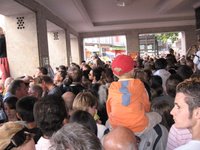
People, people everywhere 人山人海
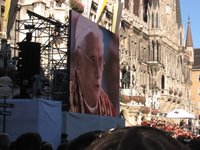

The Pope speaking to the mass 教宗演講

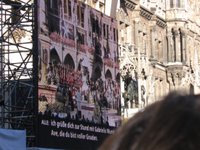
The choir 聖詩合唱
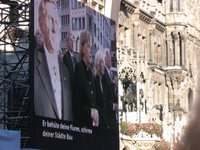
The 'big shots' of German politics (German Chancellor Angela Merkel is seen second from left.)
德國政要(左二為總理默克爾)

The Pope signing the special visitors' book
教宗簽署特別訪客簿
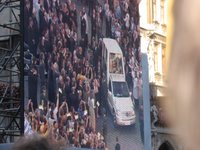
Back on the 'Papamobile', the Pope is on to his next destination.
教宗返回座駕,前往下一站。
Not everyone was glad to see him around town, however. The streets and shops were noticeably quieter than usual, and the shops along the touring route had to close because of security reasons or because there was no way customers could beat the crowd to reach the shops. The Pope’s visit was hardly a godsend for the business owners.
My colleagues warned me beforehand that the crowd would be horrible. Well, it wasn’t too bad before he arrived. I could find myself a good spot to see and photograph the Pope in a street near Marienplatz. But when everyone started heading to Marienplatz for the mass, it was impossible to move on one’s own accord but only through pushes from the back. I finally settled into a place to watch the mass, but unfortunately I could only rely on the broadcast on big screen. The Pope was on the opposite side of Marienplatz to where he entered, and I was separated from him by the massive crowd and the statue of Mary in the centre of the square. I still have to figure out what makes the Pope such a popular guy that can stop the world and pull in big crowds to his ‘party’.
教宗本篤十六世來自慕尼黑附近的小鎮,跟很多到外地打工的人一樣會回鄉探親,他昨天光臨慕尼黑,就像我廣結人緣的朋友一樣,一回國就自動有人會安排慶祝活動——就是巡遊市區及在市中心瑪利亞廣場舉行露天彌撒。難得有機會親眼見教宗,我也去湊湊熱鬧。
也不是所有人都歡迎他歸來,昨午街道和店鋪平常的人潮消失了,巡遊路線沿途的商店更因保安或街道太擠的問題而被迫休息,教宗來訪可算「多謝兼盛惠」了。(按:「多謝兼盛惠」乃廣東話反語。)
同事曾預告街道將會很擠,其實教宗未到前也不壞,一個鐘頭前也能在瑪利亞廣場附近的一條路找到有利位置觀看和拍攝,但當所有人從巡遊沿途一同湧往露天彌撒時,根本走也走不動,全靠人推人前進,好容易才找到一個位置觀看彌撒,可是他位處進入廣場的另一邊,中間隔着人群及廣場中央的瑪利亞人像,我祇好靠看大銀幕的轉播。教宗究竟有何魅力,令凡人無法擋?
Before the Pope arrived 教宗抵達前


The Pope touching down in Munich, as seen from a TV screen
銀幕播映教宗下機


The crowd waiting in anticipation 萬眾期待
 A more jubilous way to wait, by chanting and dancing
A more jubilous way to wait, by chanting and dancing唱歌跳舞,興高采烈等待教宗來臨

Greet God (Grüß Gott), and greet the Pope! ('Grüß Gott' is a popular greeting phrase in Southern Germany in Austria.)
教宗你好!
I saw the Pope! 我見到教宗!
I filmed the Pope as he was travelling along the last section of the touring route! See this link below.
我拍下了教宗巡遊最後一段路程的片段,點擊以下即可見。
http://www.youtube.com/v/XcIduLhv1Eg
The outdoor mass 露天彌撒


People, people everywhere 人山人海


The Pope speaking to the mass 教宗演講


The choir 聖詩合唱

The 'big shots' of German politics (German Chancellor Angela Merkel is seen second from left.)
德國政要(左二為總理默克爾)

The Pope signing the special visitors' book
教宗簽署特別訪客簿

Back on the 'Papamobile', the Pope is on to his next destination.
教宗返回座駕,前往下一站。
Comments
by the way, I keep meaning to wish you a very belated Happy Birthday!